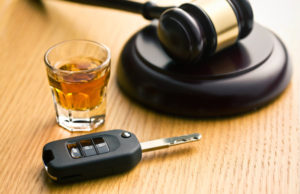Being arrested for a DUI or driving under the influence in California is covered by the Vehicle Code statutes 23152(a) through(f). VC23152(a) states: “It is unlawful for a person who is under the influence of any alcoholic beverage to drive a vehicle.” This means that if you have any amount of alcohol in your system and the prosecution can prove that it affected your ability to operate a motor vehicle as a “reasonably prudent person” would, you are in violation of the law. This means that it is quite possible that even if you are under the legal limit as designated by section VC23152(b) .08 percent alcohol in your blood, you can still be charged with driving under the influence of alcohol. Alcohol impairment affects certain individuals differently than others. As such, someone who may not display symptoms of alcohol impairment at .06 might be safe to drive and thus be legal while as some people may feel the effects of .06 blood alcohol level and it may impair their ability to drive safely. How is this determined? Who is impaired and who isn’t? The final decider is the jury. They are the final arbiters of who is impaired and who isn’t, but as far as filing charges, the District Attorneys’ office makes the decision. What do they look for in making that decision? If someone is weaving within the lanes, if the person does poorly on the balance tests and other filed sobriety tests, if they have physical symptoms of intoxication such as slurred speech, slow reaction time, and bloodshot watery eyes. These are all indicators that there is a possibility that the person is driving impaired. Remember, the more factors showing impairment, the more likely the person will be arrested.
Other factors that might trigger a law enforcement stop are falling asleep in the car at a stop light in the middle of the road, excessive speed, driving without lights and other infractions. Remember, the officer only needs probable cause to make a traffic stop. That is, he or she must witness some infraction of the law to make contact with the driver. Once that contact is legally made, then the officer can conduct a DUI investigation and will make a determination as to whether the person is impaired. Remember, you always have a right to an attorney and a jury trial. You are innocent until proven guilty once the trial starts. Just because you were arrested does not mean that you are guilty.
Vehicle Code 23152(b) states: “It is unlawful for a person who has 0.08 percent or more, by weight, of alcohol in his or her blood to drive a vehicle.” That means that if there are .08 grams of alcohol in a 100 milliliter sample of your blood or more, you are driving in violation of VC23152((b). But what if you are a regular drinker and you “hold your alcohol well”? Or maybe you don’t exhibit any symptoms of impairment or you were only speeding a little bit and did well on your balance tests. It doesn’t matter. If you have .08 grams of alcohol in 100 milliliters of blood or in 210 liters of your breath, you are in violation of the law. Again, when arrested, the standard is probable cause for there to be a legal arrest. That does not make you guilty. You have the right to have an attorney represent you in court and there are many potential defenses to the charge of driving with over .08 alcohol.
An example of a possible defense is that when you were stopped your blood alcohol level was still rising. You just finished your last drink just a few minutes before being pulled over and by the time you submitted to a blood or breath test thirty minutes later, your test result showed a much higher result that what you actually were at the time of driving when the officer stopped you. Of course, the reverse can be true also. If you tell the officer that your last drink was two hours ago and thirty minutes after you are stopped you submit to a breath test and it shows an alcohol percentage of .09, it would be a very difficult if not impossible argument to say that you were still rising and that you were under .08 at the time of the stop. Again, keep in mind, when stopped by an officer for DUI, whether you feel you are impaired or not, always show a respectful attitude and don’t argue with the officer. Comply with all of his directives and address him or her appropriately. If you are right at the limit and show courtesy and respect you just might avoid an arrest and get off with just a warning. Being cooperative does not mean that you are obligated to talk about how much you had to drink or when you started and when you stopped. Those questions all involve potentially incriminating evidence, but you can still be nice when you tell the officer your name and address and that you will submit to the breath test or blood test back at the station. Remember, you are not required to blow into the breath machine on the side of the road. That is the preliminary alcohol screening device. However, once arrested and taken into custody and transported back to the jail or police station and asked to submit to a breath or blood test, noncompliance will result in a one year suspension of your license.
Vehicle Code 23152(d) states: “It is unlawful for a person who has 0.04 percent or more, by weight, of alcohol in his or her blood to drive a commercial motor vehicle as defined in Section 15210.” For obvious reasons, truck drivers and commercial vehicles carry a greater risk of injury if involved in an accident and as such the drivers of these vehicles are held to a stricter standard. All other defenses mentioned above still apply.
Vehicle Code 23152(e) states: “It is unlawful for a person who is under the influence of any drug to drive a motor vehicle.” Does that mean I can’t smoke marijuana and drive my car? It does if it impairs your ability to safely operate the vehicle. If it doesn’t then no problem. Who decides? Just like VC23152(a), the jury gets the final say and the prosecutor looks for the same factors as in the case of alcohol impairment; physical symptoms and erratic driving. Each case is different and there is no clear demarcation as in the case of 0.08 for alcohol. All drugs are covered under this section. They can be illegal drugs or prescribed drugs. It makes no difference You could be charged with driving under the influence of drugs by taking over the counter cough medicine if it can be shown that it impairs driving.
Vehicle Code 23152(f) states: “It is unlawful for a person who is under the combined influence of any alcoholic beverage and drug to drive a vehicle.” Some marijuana by itself may not impair driving but that same amount combined with a little alcohol can be a very potent combination and impair your driving. Most experts would agree. When combing different types of both legal and illegal drugs and with alcohol, the effects of each individual drug can be significantly magnified and it is not a good idea to operate a vehicle when so doing.
Always consult a DUI attorney regarding your DUI case. It can make the difference between a conviction or a dismissal


I know that there’s a possibility that I’ll be driving while under the influence of alcohol. I’ll make sure to contact a lawyer right away because as you’ve mentioned even though they have arrested me I’m still innocent until proven guilty. I just hope that I will be able to find an excellent DUI lawyer just in case this unfortunate event takes place.